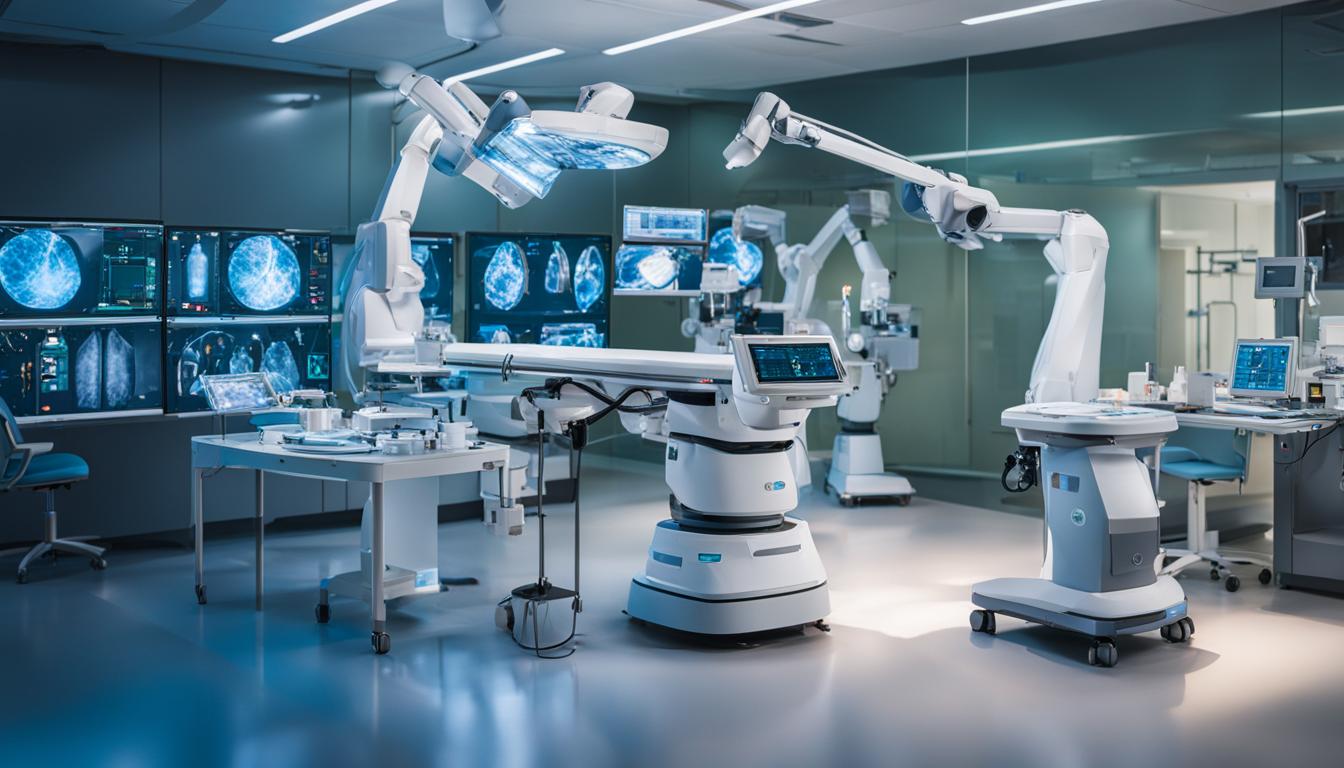Dive deep with us into the revolutionary effects of artificial intelligence (AI) on healthcare and the practice of medicine. AI has the potential to utterly transform the way we manage patient care, diagnose conditions, and approach treatment options, marking the beginning of a new chapter in improved health outcomes. This article will explore the current state of AI in clinical environments, examining its role in disease detection, treatment recommendation, and enhancing patient communication, all the while addressing the challenges and ethical considerations associated with implementing AI in healthcare.
Key Takeaways:
- AI technology is reshaping healthcare by enhancing patient care and quality of life.
- AI applications in disease diagnosis are proving to be highly accurate and efficient.
- Treatment recommendations aided by AI can optimize personalized medicine options.
- AI-driven healthcare systems improve patient engagement and overall healthcare experience.
- The implementation of AI in healthcare requires responsible ethical and legal considerations.
The Growing Role of AI in Clinical Practice
Artificial intelligence (AI) is increasingly playing a vital role in clinical practice, revolutionizing healthcare and improving patient outcomes. With its ability to analyze vast amounts of data and identify patterns, AI is transforming disease diagnosis, treatment recommendations, and patient engagement.
In disease diagnosis, AI applications are proving to be highly accurate and efficient. AI systems, powered by machine learning and deep learning algorithms, can analyze medical images and detect abnormalities with greater precision than human physicians. For example, in cancer diagnosis, AI algorithms have demonstrated high sensitivity and specificity, leading to early detection and more effective treatment plans.
When it comes to treatment recommendations, AI can provide personalized options based on patient data and medical literature. By considering patients’ specific characteristics, AI algorithms can predict treatment outcomes and help healthcare professionals make informed decisions. AI also contributes to drug discovery, analyzing vast datasets to identify potential medications for various diseases.
| AI Applications in Clinical Practice | Benefits |
|---|---|
| Disease Diagnosis | Improved accuracy and early detection |
| Treatment Recommendations | Personalized medicine and optimized treatment plans |
| Patient Engagement | Enhanced communication and education |
Furthermore, AI is enhancing patient engagement and care. AI-driven systems can provide virtual health assistants, offering round-the-clock support and guidance to patients. These assistants can answer questions, provide educational resources, and monitor patients’ health status remotely. By empowering patients with information and personalized care, AI is revolutionizing the healthcare experience.
As AI continues to advance, it is crucial to address the ethical and legal considerations surrounding its implementation. Data privacy, algorithm biases, and the need for human expertise are among the challenges that need to be addressed for the responsible use of AI in healthcare. By navigating these challenges, we can unlock the full potential of AI and shape the future of clinical practice.

The Future of AI in Clinical Practice
The future of AI in clinical practice holds great promise. Ongoing research and development are expected to further improve AI’s capabilities in disease diagnosis, treatment recommendations, and patient care. As AI technologies continue to evolve, healthcare professionals and patients alike can look forward to a future where AI plays a central role in delivering high-quality, personalized healthcare.
AI in Disease Diagnosis
AI technology is making significant strides in the field of disease diagnosis. With the ability to analyze large datasets and utilize advanced algorithms, AI tools are proving to be invaluable in accurately detecting and diagnosing various medical conditions. These advancements have the potential to revolutionize healthcare by improving diagnostic accuracy and facilitating early intervention.
One area where AI has shown great promise is in cancer diagnosis. Studies have shown that AI systems can effectively detect breast cancer and skin cancer, often surpassing the accuracy of human physicians. By analyzing vast amounts of medical imagery and utilizing deep learning techniques, AI algorithms can identify subtle patterns and early-stage indicators of cancer, enabling timely diagnosis and treatment.
AI in disease diagnosis has the potential to transform healthcare by improving accuracy and enabling early intervention.
In addition to cancer, AI is also being utilized in dermatology diagnosis. Skin conditions can be challenging to diagnose accurately, especially for rare or complex diseases. However, AI algorithms can analyze images of skin conditions and compare them with extensive databases to provide accurate and efficient diagnoses. This aids dermatologists in providing appropriate treatment options and improving patient outcomes.
AI Tools for Disease Diagnosis
Various AI tools are being developed for disease diagnosis, including computer-aided detection (CAD) systems and AI-powered medical imaging technologies. CAD systems use algorithms to analyze medical images, assisting radiologists in detecting abnormalities and making accurate diagnoses. Similarly, AI-powered medical imaging technologies can analyze complex medical images, such as X-rays and MRIs, to aid in the diagnosis of various conditions.
The table below provides an overview of AI advancements in disease diagnosis:
| Disease | AI Application | Benefits |
|---|---|---|
| Breast Cancer | AI-powered mammography analysis | Improved accuracy in detecting early-stage cancer |
| Skin Cancer | AI analysis of dermoscopy images | Accurate and efficient diagnosis of skin conditions |
| Lung Cancer | Computer-aided detection systems for chest X-rays | Enhanced detection of early-stage lung cancer |
These advancements in AI for disease diagnosis have the potential to revolutionize healthcare by improving accuracy, facilitating early intervention, and ultimately saving lives. As AI continues to evolve, it is crucial for healthcare professionals and researchers to collaborate and harness the full potential of this technology in the fight against various diseases.

AI in Treatment Recommendations
AI has emerged as a valuable tool in providing treatment recommendations, offering personalized medicine options, and aiding in drug discovery. With its ability to analyze vast amounts of patient data, AI can assist healthcare professionals in making informed decisions and optimizing treatment outcomes.
One of the significant advantages of AI in treatment recommendations is the ability to provide personalized medicine options. By leveraging machine learning algorithms, AI can analyze individual patient data, including medical history, genetics, lifestyle factors, and treatment responses. This analysis enables AI to generate tailored treatment plans that consider unique patient characteristics, ultimately improving treatment efficacy.
AI is also making significant contributions to the field of drug discovery. Through advanced algorithms and data mining techniques, AI can identify potential therapeutic targets and predict the effectiveness of experimental treatments. This capability accelerates the drug discovery process, reducing costs and time to market, and potentially leading to the development of more effective treatments for various diseases.
Additionally, AI technology aids in treatment selection by predicting treatment outcomes and optimizing medication dosages. By analyzing large datasets and learning from patterns in patient responses, AI algorithms can provide healthcare professionals with valuable insights and recommendations. This support empowers physicians to make more informed decisions and potentially improve patient outcomes.
| Advantages of AI in Treatment Recommendations | Applications |
|---|---|
| Personalized medicine | Using patient data to generate tailored treatment plans |
| Drug discovery | Identifying potential therapeutic targets and predicting treatment effectiveness |
| Treatment selection | Predicting treatment outcomes and optimizing medication dosages |
AI in treatment recommendations enables healthcare professionals to provide personalized and optimized care, improving treatment efficacy and patient outcomes.
In conclusion, AI plays a crucial role in treatment recommendations by providing personalized medicine options, aiding in drug discovery, and optimizing treatment selection. The ability of AI to analyze vast amounts of patient data and identify patterns allows for more informed decision-making and potentially improved patient outcomes. As AI technology continues to advance, its contributions to treatment recommendations are expected to further enhance the field of healthcare.

AI in Patient Engagement and Care

AI is playing an increasingly important role in patient engagement and care, revolutionizing the way healthcare is delivered. With the development of AI-driven healthcare systems, patients can now benefit from personalized recommendations and improved access to information and support.
One of the key applications of AI in patient engagement is through the use of virtual health assistants. These AI-powered tools can provide personalized guidance, answer questions, and offer support to patients, enhancing their overall healthcare experience. Virtual health assistants can also help with patient education, providing detailed explanations of medical conditions, treatment options, and medication instructions.
AI-driven healthcare systems have the potential to greatly improve patient care and outcomes. With virtual health assistants and personalized recommendations, patients can have a more active role in their healthcare journey.
In addition to virtual health assistants, AI can also support mental health care by analyzing patient data and identifying potential issues. Through sentiment analysis and natural language processing, AI algorithms can detect changes in mood and behavior, alerting healthcare professionals to intervene and provide timely support.
By leveraging AI in patient engagement and care, healthcare providers can enhance the patient experience, improve health outcomes, and empower individuals to take a more proactive approach to their own well-being.
AI in Patient Engagement and Care Summary:
- AI-powered virtual health assistants provide personalized guidance and support to patients.
- AI can enhance patient education by providing detailed explanations and information.
- AI supports mental health care by analyzing patient data for early detection of issues.
- By leveraging AI, healthcare providers can improve the patient experience and empower individuals in their own healthcare journey.
Table: Benefits of AI in Patient Engagement and Care
| Benefits | Description |
|---|---|
| Personalized Recommendations | AI-driven systems offer personalized treatment and care suggestions based on patient data. |
| Improved Access to Information | Virtual health assistants provide instant access to medical information and resources. |
| Enhanced Patient Education | AI tools offer detailed explanations and education materials for patients to better understand their conditions and treatments. |
| Support for Mental Health Care | AI algorithms can analyze patient data to detect changes in mood and behavior, enabling early intervention and support. |
With AI-driven healthcare systems and virtual health assistants, the future of patient engagement and care looks promising. As technology continues to advance, we can expect further innovations and improvements in healthcare delivery, ultimately leading to better patient outcomes and a more patient-centered approach to care.
Ethical and Legal Considerations in AI Implementation
As we delve into the world of AI in healthcare, it is crucial to address the ethical and legal considerations associated with its implementation. While AI holds immense potential for improving patient care and outcomes, responsible use and adherence to ethical guidelines are paramount. We must navigate the complex landscape of data privacy, biases in AI algorithms, and the need for human expertise to ensure the responsible implementation of AI in healthcare.
One of the key ethical considerations is data privacy. As AI algorithms analyze vast amounts of patient data, it is essential to protect individuals’ privacy and ensure that sensitive information is secure. Striking a balance between deriving valuable insights from data and safeguarding patient privacy is crucial for building trust in AI-driven healthcare systems. The responsible handling of data can help mitigate concerns regarding data breaches and misuse of personal health information.
Another important consideration is the potential biases that may exist within AI algorithms. AI systems learn from large datasets, and if these datasets contain biases, it can inadvertently perpetuate those biases in healthcare decision-making. Recognizing and addressing these biases is essential to ensure fair and equitable treatment for all patients. Regular audits and algorithmic transparency can help identify and rectify biases, promoting fairness and equality in healthcare delivery.
AI in healthcare must be implemented with careful consideration and adherence to legal frameworks. Compliance with existing regulations, such as HIPAA in the United States, is essential to protect patient confidentiality and ensure the responsible use of AI. Additionally, as AI continues to evolve, it is important to stay updated on legal developments and adapt AI systems accordingly. This can help mitigate legal risks and ensure that AI is utilized in a manner that aligns with legal requirements and patient rights.
Responsible implementation of AI in healthcare
In order to ensure the responsible implementation of AI in healthcare, collaboration between healthcare professionals, policymakers, and technology experts is necessary. Multidisciplinary discussions can help establish guidelines and frameworks that address the ethical and legal considerations associated with AI. Furthermore, ongoing monitoring and evaluation of AI systems are crucial to detect and rectify any ethical or legal issues that may arise.
By taking a proactive approach to address ethical and legal considerations, we can harness the power of AI to improve patient care while upholding the highest standards of ethics and privacy. Responsible AI implementation in healthcare holds the promise of revolutionizing the field and transforming the way we deliver quality care to patients.

| Ethical Considerations | Legal Considerations |
|---|---|
| Data privacy | Compliance with regulations (e.g., HIPAA) |
| Biases in AI algorithms | Staying updated on legal developments |
| Ensuring fairness and equality |
The Future of AI in Healthcare
As we continue to push the boundaries of technological innovation, the future of AI in healthcare holds immense promise for transforming the field of medicine. With ongoing advancements and breakthroughs, AI technology is poised to revolutionize patient care, diagnostics, and treatment. The potential impact of AI in healthcare is vast, with the ability to improve accuracy, efficiency, and accessibility.
AI advancements in medicine are enabling us to harness the power of large datasets and complex algorithms to diagnose diseases with greater precision and speed. By analyzing vast amounts of patient data, AI can identify patterns and detect early stages of diseases, leading to earlier intervention and improved outcomes. This has the potential to revolutionize disease diagnosis and improve healthcare outcomes for patients.
Additionally, AI technology in healthcare is paving the way for personalized medicine. AI algorithms can analyze patient data, including genetic information, to recommend treatment options tailored to an individual’s unique characteristics. By optimizing treatment recommendations, AI has the potential to improve patient outcomes and enhance the effectiveness of therapies.
| AI Advancements in Medicine | AI Technology in Healthcare |
|---|---|
| Improved disease diagnosis | Predictive analytics |
| Personalized treatment recommendations | Virtual health assistants |
| Enhanced patient care | Workflow automation |
While AI in healthcare presents exciting opportunities, it is crucial to address ethical considerations and navigate potential challenges. As AI becomes increasingly integrated into healthcare systems, it is important to ensure data privacy, minimize biases in algorithms, and preserve the human element in patient care. Responsible implementation and ongoing ethical discussions will be essential to maximize the benefits of AI in healthcare.
As we look to the future, the potential of AI in healthcare is both exhilarating and transformative. With ongoing research and development, AI technologies will continue to evolve and have a significant impact on the field of medicine. The future is bright, and we are excited to be part of this journey towards leveraging AI to revolutionize healthcare and improve patient outcomes.
The Challenges and Limitations of AI in Healthcare
Implementing artificial intelligence (AI) in healthcare comes with its own set of challenges and limitations. While AI has the potential to revolutionize patient care and improve healthcare outcomes, it is important to address these hurdles for responsible and effective implementation.
One of the main challenges is ensuring data privacy and security. As AI relies on vast amounts of patient data, it is crucial to protect sensitive information and adhere to strict privacy regulations. Healthcare organizations must implement robust security measures to safeguard patient data and prevent unauthorized access.
Bias in AI algorithms is another significant concern. AI systems learn from data, and if the data is biased or incomplete, it can lead to biased outcomes. To mitigate this, it is essential to have diverse and representative datasets that account for different demographics. Additionally, ongoing monitoring and evaluation of AI systems can help identify and rectify any biases that may arise.
Another limitation of AI in healthcare is the need for human expertise. While AI can assist in diagnosing diseases and recommending treatments, it cannot replace the knowledge and experience of healthcare professionals. Combining the strengths of AI with human expertise can lead to more accurate diagnoses and better patient outcomes. Therefore, it is crucial to strike a balance between AI technologies and human intervention.
In summary, the challenges and limitations of AI in healthcare include data privacy, bias in algorithms, and the need for human expertise. Addressing these issues is essential for responsible and effective implementation of AI in clinical practice. By overcoming these hurdles, we can harness the full potential of AI to revolutionize healthcare and improve patient care.
AI for Healthcare Professionals
AI is revolutionizing healthcare by providing valuable support to healthcare professionals in their roles. Rather than replacing physicians, AI technology complements their expertise, assisting with accurate diagnoses, treatment recommendations, and workflow management. As the field of healthcare evolves, so do the roles of physicians in an AI-driven healthcare system.
AI training for physicians is becoming increasingly important to ensure they can effectively leverage AI technology in their practice. By mastering AI tools and algorithms, healthcare professionals can enhance their decision-making processes and improve patient outcomes. This training equips physicians with the skills necessary to interpret and utilize AI-generated data, enabling them to deliver more precise and personalized care.
The Impact of AI on the Healthcare Workforce
The integration of AI in healthcare introduces new possibilities for the healthcare workforce. While some fear that AI may replace healthcare professionals, it is more likely that AI will reshape their roles. As AI takes on routine and time-consuming tasks, physicians can focus more on complex patient care and decision-making, resulting in improved efficiency and patient satisfaction.
Additionally, AI technology can help address the growing demand for healthcare services by reducing workloads and enhancing productivity. With AI-powered tools, healthcare professionals can streamline administrative tasks, optimize scheduling, and improve patient flow. This enables healthcare providers to see more patients, ultimately increasing access to quality care.
Overall, AI is transforming healthcare by empowering healthcare professionals with advanced tools and capabilities. By embracing AI training and adopting AI-driven healthcare systems, physicians can enhance their practice, improve patient outcomes, and shape the future of healthcare.
Conclusion
In conclusion, AI is revolutionizing healthcare and medicine by transforming patient care, diagnostics, and treatment. The advancements in AI technology are paving the way for improved healthcare outcomes and a more efficient healthcare system. With the ability to analyze large datasets and identify patterns, AI has the potential to assist healthcare professionals in disease diagnosis, treatment recommendations, and patient engagement.
However, the implementation of AI in healthcare comes with ethical and legal considerations that must be addressed for responsible use. Issues such as data privacy and biases in AI algorithms require careful attention to ensure patient safety and trust. Additionally, challenges and limitations such as the need for human expertise must be overcome to maximize the benefits of AI in healthcare.
Looking ahead, the future of AI in medicine is promising. Ongoing research and development will continue to enhance AI technologies, leading to further advancements and innovations in disease diagnosis, treatment, and patient care. We must embrace the transformative power of AI in healthcare and work towards responsible and effective implementation, ensuring that AI complements the expertise of healthcare professionals and improves the overall quality of healthcare.
FAQ
How can AI revolutionize healthcare?
AI can revolutionize healthcare by assisting with disease diagnosis, recommending treatment options, and improving patient engagement. AI technologies analyze large datasets and identify patterns that surpass human performance in healthcare tasks.
What are the applications of AI in clinical practice?
AI is being utilized for disease diagnosis, treatment recommendations, and patient engagement. It can accurately diagnose diseases like cancer and dermatology conditions, predict treatment outcomes, and provide personalized medicine options. AI-driven healthcare systems can also support patient education and provide virtual health assistants.
How accurate is AI in disease diagnosis?
Studies have shown that AI systems can accurately diagnose diseases such as breast cancer and skin cancer, often outperforming human physicians. By analyzing large datasets and using deep learning techniques, AI can identify patterns and detect early stages of diseases.
What is the role of AI in treatment recommendations?
AI can assist healthcare professionals in making treatment recommendations by analyzing patient data and providing personalized medicine options. Through machine learning algorithms, AI can predict treatment outcomes and optimize medication dosages. AI is also being used in drug discovery to identify potential treatments for various diseases.
How can AI enhance patient engagement and care?
AI-driven healthcare systems can provide virtual health assistants, support mental health care, and improve patient education. These systems automate tasks, provide personalized recommendations, and improve patient-physician trust, thereby enhancing patient engagement and care.
What are the ethical and legal considerations in AI implementation?
The implementation of AI in healthcare raises ethical and legal considerations that must be addressed. Issues such as data privacy, biases in AI algorithms, and the need for human expertise must be carefully considered for responsible and effective use.
What does the future hold for AI in healthcare?
The future of AI in healthcare holds great potential for further advancements and innovations. Ongoing research and development are expected to continue improving disease diagnosis, treatment recommendations, and patient care.
What are the challenges and limitations of AI in healthcare?
While AI offers numerous benefits in healthcare, there are also challenges and limitations that need to be addressed. Issues such as data privacy, biases, and the need for human expertise can impact the responsible and effective implementation of AI in healthcare settings.
How can AI support healthcare professionals?
AI can support healthcare professionals by providing accurate diagnoses, treatment recommendations, and workflow management. It can assist physicians in their roles, but it is not meant to replace them. AI technology can enhance healthcare outcomes by augmenting human expertise.
How is AI transforming the future of healthcare?
AI is transforming the future of healthcare by revolutionizing patient care, diagnostics, and treatment. From disease diagnosis to treatment recommendations and patient engagement, AI technologies have the potential to improve healthcare outcomes.









